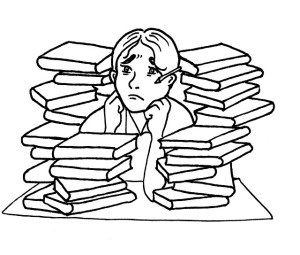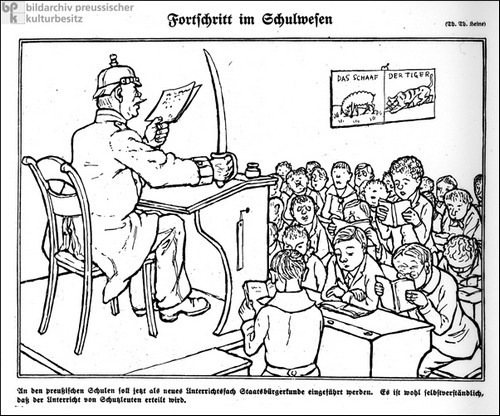by Author Alfie Kohn – ICPA.org:
Widespread misconceptions about learning keep our children busy with needless assignments.
There’s something perversely fascinating about educational policies that are clearly at odds with the available data. Huge schools are still being built, even though we know that students tend to fare better in smaller places that lend themselves to the creation of democratic caring communities. Many children who are failed by the academic status quo are forced to repeat a grade, even though research shows that this is just about the worst course of action for them. Homework continues to be assigned— in ever greater quantities—despite the absence of evidence that it’s necessary, or even helpful, in most cases.
The dimensions of that last disparity weren’t clear to me until I began sifting through the research for a new book. To begin with, I discovered that decades of investigation have failed to turn up any evidence that homework is beneficial for students in elementary school. Even if you regard standardized test results as a useful measure, homework (some versus none, or more versus less) isn’t even correlated with higher scores at these ages. The only effect that correlates with homework is a more negative attitude toward school on the part of students who get more assignments.
In high school, some studies do find a correlation between homework and test scores (or grades), but it’s usually fairly small, and it has a tendency to disappear when more sophisticated statistical controls are applied. Moreover, there’s no evidence that higher achievement is due to the homework, even when an association does appear. It isn’t hard to think of other explanations for why successful students might be in classrooms where more homework is assigned—or why they might spend more time on it than their peers do.
The results of national and international exams raise further doubts. One of many examples is an analysis of 1994 and 1999 Trends in Mathematics and Science Study (TIMSS) data from 50 countries. Researchers David Baker and Gerald LeTendre were scarcely able to conceal their surprise when they published their results in 2005: “Not only did we fail to find any positive relationships,” they wrote, but “the overall correlations between national average student achievement and national averages in [amount of homework assigned] are all negative.”
Finally, there isn’t a shred of evidence to support the widely accepted assumption that homework yields nonacademic benefits for students of any age. The idea that homework teaches good work habits or develops positive character traits (such as self-discipline and independence) could be described as an urban myth, except for the fact that it’s taken seriously in suburban and rural areas, too.
In short, regardless of one’s criteria, there is no reason to think that most students would be at any sort of disadvantage if homework were sharply reduced or even eliminated. Nevertheless, the overwhelming majority of American schools—elementary and secondary, public and private—continue to require their students to work a second shift by bringing academic assignments home. Not only is this requirement accepted uncritically, but the amount of homework is growing, particularly in the early grades. A large, long-term national survey found that the proportion of 6- to 8-year-old children who reported having homework on a given day had climbed from 34 percent in 1981 to 58 percent in 1997—and the weekly time spent studying at home more than doubled.
Sandra Hofferth of the University of Maryland, one of the authors of that study, has just released an update based on 2002 data. In it, the proportion of young children who had homework on a specific day has jumped to 64 percent, and the amount of time they spent on it has climbed by another third. The irony here is painful, because with younger children the evidence to justify homework isn’t merely dubious—it’s nonexistent.
Why Homework Persists
So why do we do something where the cons (stress, frustration, family conflict, loss of time for other activities, a possible diminution of interest in learning) so clearly outweigh the pros? Possible reasons include a lack of respect for research, a lack of respect for children (implicit in a determination to keep them busy after school), a reluctance to question existing practices, and the top-down pressures to teach more stuff faster in order to pump up test scores, so we can chant, “We’re number one!”
All of these explanations are plausible, but I think there’s also something else responsible for our continuing to feed children this latter-day cod-liver oil. Because so many of us believe that it’s just common sense that homework would provide academic benefits, we tend to shrug off the failure to find any such benefits. Our belief that homework ought to help is based on some fundamental misunderstandings about learning.
Consider the assumption that homework should be beneficial just because it gives students more time to master a topic or skill. (Plenty of pundits rely on this premise when they call for extending the school day or year. Indeed, homework can be seen as a way of prolonging the school day on the cheap.) Unfortunately, this reasoning turns out to be woefully simplistic. “When experimental psychologists mainly studied words and nonsense syllables, it was thought that learning inevitably depended upon time,” reading researcher Richard C. Anderson and his colleagues explain. “Subsequent research suggests that this belief is false.”
The statement “People need time to learn things” is true, of course, but it doesn’t tell us much of practical value. On the other hand, the assertion “More time usually leads to better learning” is considerably more interesting. It’s also demonstrably untrue, however, because there are enough cases where more time doesn’t lead to better learning.
In fact, more hours are least likely to produce better outcomes when understanding or creativity is involved. Anderson and his associates found that when children are taught to read by focusing on the meaning of the text (rather than primarily on phonetic skills), their learning does “not depend on amount of instructional time.” In math, too, as another group of researchers discovered, time on task is directly correlated to achievement only if both the activity and the outcome measure are focused on rote recall, as opposed to problem solving.
Carole Ames of Michigan State University points out that it isn’t “quantitative changes in behavior”—such as requiring students to spend more hours in front of books or worksheets—that help children learn better. Rather, it’s “qualitative changes in the ways students view themselves in relation to the task, engage in the process of learning, and then respond to the learning activities and situation.” In turn, these attitudes and responses emerge from the way teachers think about learning and, as a result, how they organize their classrooms. Assigning homework is unlikely to have a positive effect on any of these variables. We might say that education is less about how much the teacher covers than about what students can be helped to discover— and more time won’t help to bring about that shift.
Alongside an overemphasis on time is the widely held belief that homework “reinforces” the skills that students have learned—or, rather, have been taught—in class. But what exactly does this mean? It wouldn’t make sense to say, “Keep practicing until you understand,” because practicing doesn’t create understanding— just as giving kids a deadline doesn’t teach time-management skills. What might make sense is to say, “Keep practicing until what you’re doing becomes automatic.” But what kinds of proficiencies lend themselves to this sort of improvement?
The answer is behavioral responses. Expertise in tennis requires lots of practice; it’s hard to improve your swing without spending a lot of time on the court. But to cite an example like that to justify homework is an example of what philosophers call begging the question. It assumes precisely what has to be proved, which is that intellectual pursuits are like tennis.
Learning Versus Drill
The assumption that education and tennis are analogous derives from behaviorism, which is the source of the verb “reinforce,” as well as the basis of an attenuated view of learning. In the 1920s and ’30s, when John B. Watson was formulating his theory that would come to dominate education, a much less famous researcher named William Brownell was challenging the drilland- practice approach to mathematics that had already taken root. “If one is to be successful in quantitative thinking, one needs a fund of meanings, not a myriad of ‘automatic responses,’” he wrote. “Drill does not develop meanings. Repetition does not lead to understandings.” In fact, if “arithmetic becomes meaningful, it becomes so in spite of drill.”
Brownell’s insights have been enriched by a long line of research demonstrating that the behaviorist model is, if you’ll excuse the expression, deeply superficial. People spend their lives actively constructing theories about how the world works, and then reconstructing them in light of new evidence. Lots of practice can help some students get better at remembering an answer, but not to get better at—or even accustomed to—thinking. And even when they do acquire an academic skill through practice, the way they acquire it should give us pause. As psychologist Ellen Langer has shown, “When we drill ourselves in a certain skill so that it becomes second nature,” we may come to perform that skill “mindlessly,” locking us into patterns and procedures that are less than ideal.
Practice Makes Problems
But even if practice is sometimes useful, we’re not entitled to conclude that homework of this type works for most students. It isn’t of any use for those who don’t understand what they’re doing. Such homework makes them feel stupid; gets them accustomed to doing things the wrong way (because what’s really “reinforced” are mistaken assumptions); and teaches them to conceal what they don’t know. At the same time, other students in the same class already have the skill down cold, so further practice for them is a waste of time. You’ve got some kids, then, who don’t need the practice and others who can’t use it.
Furthermore, even if practice was helpful for most students, that doesn’t mean they need to do it at home. In my research I found a number of superb teachers (at different grade levels and with diverse instructional styles) who rarely, if ever, found it necessary to assign homework. Some not only didn’t feel a need to make students read, write or do math at home, but they preferred to have students do these things during class, where it was possible to observe, guide and discuss.
Finally, any theoretical benefit of practice homework must be weighed against the effect it has on students’ interest in learning. If slogging through worksheets dampens one’s desire to read or think, surely that wouldn’t be worth an incremental improvement in skills. And when an activity feels like drudgery, the quality of learning tends to suffer, too. That so many children regard homework as something to finish as quickly as possible—or even as a significant source of stress—helps to explain why it appears not to offer any academic advantage even for those who obediently sit down and complete the tasks they’ve been assigned. All that research showing little value to homework may not be so surprising after all.
Supporters of homework rarely look at things from the student’s point of view, though. Instead, kids are regarded as inert objects to be acted on: Make them practice and they’ll get better. My argument isn’t just that this viewpoint is disrespectful, or that it’s a residue of an outdated stimulus-response psychology. I’m also suggesting it’s counterproductive. Children cannot be made to acquire skills. They aren’t vending machines such that we can put in more homework and get out more learning.
But just such misconceptions are pervasive in all sorts of neighborhoods, and they’re held by parents, teachers and researchers alike. It’s these beliefs that make it so hard even to question the policy of assigning regular homework. We can be shown the paucity of supporting evidence and it won’t have any impact if we’re wedded to folk wisdom (“practice makes perfect”; more time equals better results).
On the other hand, the more we learn about learning, the more willing we may be to challenge the idea that homework has to be part of schooling.
Article originally posted at ICPA.org.







